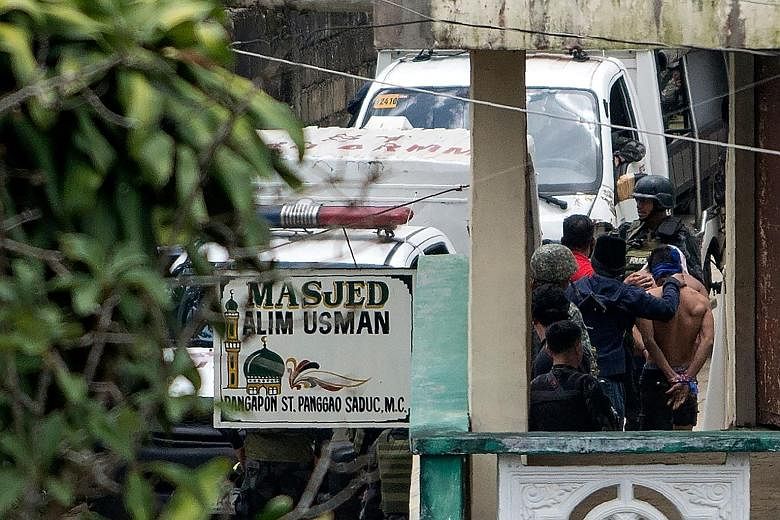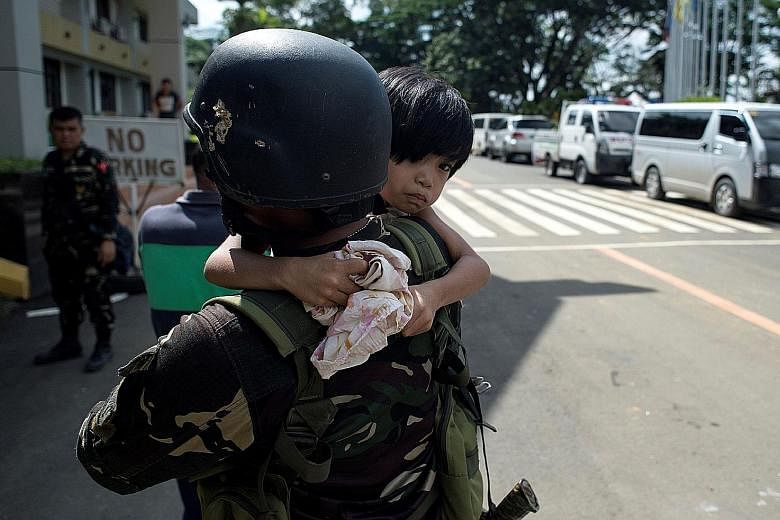A week before about 500 militants descended on Marawi and seized large parts of the city on May 23, a large gathering of the Muslim missionary group Tablighi Jama'at was held at a grand mosque there.
Thousands took part in the event, including dozens of Malaysians, Indonesians, and others from Central Asia and the Middle East.
Afterwards, some of the foreigners quietly scattered around Marawi to join a small band of Islamist militants protecting Isnilon Hapilon, designated by the Islamic State in Iraq and Syria (ISIS) as head of its South-east Asia branch.
As many as 40 of them joined the fighting in Marawi, according to unverified intelligence reports. The Philippine military said eight have been killed so far: two each from Malaysia, Indonesia and Saudi Arabia and one each from Chechnya and Yemen.
There were also Moroccans, Indians and Singaporeans, but it is unclear whether they are in Marawi now or in other war-torn areas in the restive southern island group of Mindanao.
Security experts are concerned that more militant thoughts may be creeping into Tablighi Jama'at, a Muslim missionary movement started in India in the 1920s, mangling its original mission to travel the world in peace and convert "non-believers" to Islam.
"I won't be surprised that the tablighis are being radicalised… Muslims today are really being affected by what's happening outside their world. Al-Qaeda, ISIS, the Arab Spring. They are affected by modern technology, by social media. Their world is shrinking," said Mr Macabangkit Lanto, a former Philippine ambassador to Cairo.
Mr Lanto said he once attended a big Tablighi Jama'at gathering when he was a lawmaker representing the Muslim province of Lanao del Sur in the mid-1990s.
"Back then, all we did was talk about Islam and the renewal of our faith… These days, I hear people joining Tablighi Jama'at and professing extreme ideas, rejecting the peaceful coexistence among different people with different faiths. They are acting like the Maute already," he said.
The Maute is among a glut of militant and bandit groups fighting security forces in Mindanao. It is small and relatively new, having surfaced only in 2013, but it is the most rooted in radical Muslim ideologies.
Based in Lanao del Sur, it is named after brothers Omarkhayam and Abdullah, both educated in Islamic schools in the Middle East.
Analysts say the Maute group's move to take over Marawi is part of its plan to gain recognition and secure funding from ISIS.
What worries Mr Lanto is that if Tablighi Jama'at fails to check the rise of radicals among its ranks, it may fuel Islamist militancy across South-east Asia.
Tablighi Jama'at "is catching fire", he said. He estimates that about 70 per cent of some 10 million Muslims in the Philippines are members of or have been exposed to the group.
"Without question, we are seeing an element of internationalisation of the jihadi movement in Mindanao," said Mr Richard Heydarian, a political analyst at De La Salle University in Manila.
He said the attack on Marawi "marks a precarious stage in the pivot of ISIS to the East… What we are seeing now is a perfect storm".
He said peace talks between the Philippine government and Islamist rebels are stagnating, with President Rodrigo Duterte overly focused on his war on drugs.
ISIS, meanwhile, is looking to establish distant caliphates, and wilayats ("provinces") in South-east Asia, in places like Mindanao. "That's a very dangerous intersection, a convergence that the Philippines should be worried about," he said.
Other experts, though, said concerns that Tablighi Jama'at could be used as a vehicle to spread Islamist radicalism may be overblown.
"Their interpretation of jihad is different than (that of) ISIS," said terrorism expert Ahmad el Muhammady, of the International Islamic University Malaysia (IIUM). He said the group's main focus is to share the message of Islam, "which it believes is already a form of jihad".
Likewise, terrorism researcher Maszlee Malik, also of IIUM, said the idea that Tablighi Jama'at is linked to ISIS is "far-fetched", citing a clash in ideology.
"Is it likely that this group is sympathetic to ISIS? No, not at all. However, at the individual level, there might be ISIS sympathisers who join Tablighi Jama'at for their spiritual journey."
As it is "a loose organisation", it has people from all walks of life.
"But we cannot make a sweeping statement and say that Tablighi Jama'at is akin to ISIS." he said.
•With additional reports from Nadirah H. Rodzi, in Kuala Lumpur


